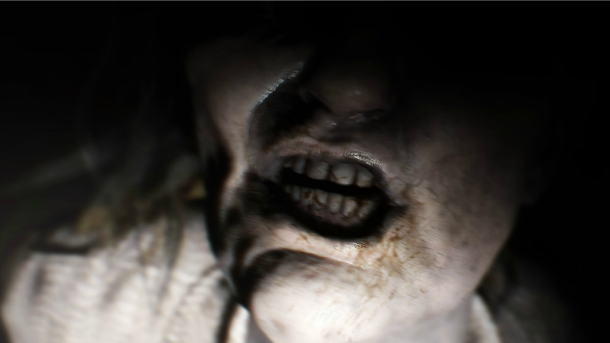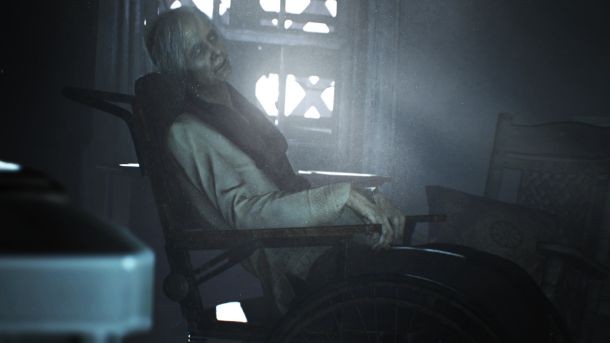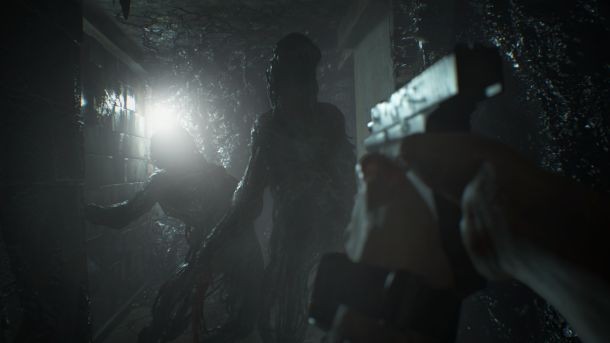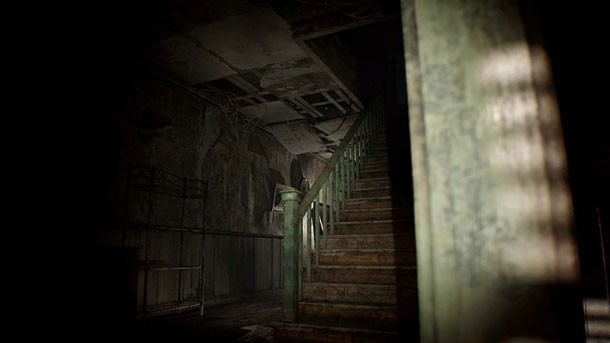Opinion – Resident Evil 7 Shows The Proper Way To Reinvent A Series

This article was originally published on 02/01/17.
I didn’t quite know what to expect when I sat down in my living room to play Resident Evil 7. I had just spent the last two weeks doing multiple playthroughs of Resident Evil 4 so I could write a piece about that game’s legacy and the influence it had on the industry as a whole. Even 12 years later, I was still awestruck by 4’s innovations and how well it had aged, so I came to 7 with much trepidation, mostly due to Capcom’s strange and ill-conceived marketing campaign for the game, which lingered too long in boring mysteries and withheld information about what 7 was actually going to be until close to launch. When I learned that the game was going “back to the series roots,” I was both cautiously optimistic and skeptical.
With the exception of 4, Resident Evil has always been a series that I liked more as an idea than a game I enjoyed playing. I can understand why players loved navigating the mansions and cityscapes that comprised the first three titles, but the tank controls, occasionally tedious puzzles, and bad bad combat made them games that I played through more out of a duty to understand what place they had in gaming history rather than something that was fun to play.
When rebooting or taking a series in another direction, developers need to know what elements to bring forward and which ones to leave behind. The Coalition did a fantastic job with this when developing Gears of War 4, dialing back the massive war scale the first three games had created, to deliver a more intimate story focusing on a new cast of characters while still having enough fan service to bandy about. Luckily, Resident Evil 7 strikes a fine balance as well, throwing 5 and 6’s action-focus to the side, returning to the creeping horror that made Resident Evil a household name while also bringing along a few innovations to make it its own.
Here’s why Resident Evil 7 is a successful reinvention of a series that needed it and hopefully some lessons that other developers can take to heart.

It’s (Mostly) Standalone
It’s rare you can play the seventh entry in a series (and that’s not including spinoffs) and recommend it to people as a good starting point for those who haven’t touched the series before. However, Resident Evil 7 doesn’t require you to have play any of the other games in the series to appreciate or follow the story it tells. That doesn’t mean there aren’t nuggets of lore or secrets for fans of the series to find (there are) but a newcomer can sit down and play through the game from beginning to end without being lost.

It’s Still A Capital-R Resident Evil Game
Yes, the game is played in a first-person perspective (more on that later). Yes, there are murderous hillbillies instead of the zombies that stumbled around earlier entries. However, the Baker’s estate is still a labyrinth of puzzles and monsters, filled with creaking hallways and traps that can swiftly spell your end if you don’t keep your wits about you as well as moments of schlocky relief. The core tenants of exploration, inventory management, and knowing when to fight and when to run that made the original Resident Evil such a gripping experience are back in full form, and yet…

There Are Enough Innovations To Make It Stand Out
With 7, you’re not replaying a next-gen version of the first Resident Evil. The dilapidated Louisiana estate setting is a far cry from the rich mansion players wandered in the first game and that matters. Floors creak. Bugs and muck seep through the floor. Resident Evil 7 is grimy and disgusting in a way that turns your stomach constantly even when there’s not a monster in sight. So much of what makes 7 tense is the tricks it plays on your mind as you wander through hallways. Was that moan on the floor above you the weight of some monster roaming the hallways for you or just the wind blowing through the house?
The first-person perspective and how it’s used also does a great job of instilling horror, narrowing your field of vision and making combat encounters with enemies tenser as they lurch toward you step by step, teeth gnashing. You also get in close and see the fangs they’ll use to chomp on your neck moments before they strike. Items are also fun to search for, requiring you to stoop down and investigate tucked-away areas for ammo and valuable aids that will help you best The Bakers.

The Allure Of Its Mystery Is Strong
Yes, Resident Evil 7’s marketing campaign was more frustrating than anything else. The game’s opening, however, does just the right amount of withholding information, giving you the basics: You’re off to investigate the disappearance (and reappearance) of your wife at a broken-down estate in Louisiana. From the outset, questions form immediately. How does this tie into Resident Evil? Will we see any fan-favorite characters? Whoa, who’s that creepy-ass dude walking around all menacing-like?
The questions only grow as you find yourself tugged into the depths of hell, but that’s part of why the entire game is so compelling.

It’s Almost Perfectly Paced
It’s natural for a series to ratchet up the tension between entries. Gears Of War, Resident Evil, Mass Effect, and Call of Duty: Modern Warfare all turned up the number of explosions and balls-to-the-walls action sequences as they went along. However, nearly all of these series at one point or another traded well-crafted, organic story beats or great level design for content or for the sake of turning everything up to 11.
Resident Evil 7 dials everything back and is astonishingly lean in comparison to Resident Evil 6, which offered over 20 hours of gameplay across several campaigns featuring a bevy of fan-favorite characters. While there’s certainly a generous offering of content for players in 6, a lot of it is boring or bad. In comparison, RE 7 is 10 hours long, and makes the most of its playtime, with each area of the Baker estate you come across more compelling than the last, and the balance between gunplay and hide-and-seek horror well-struck.

It Lays A Strong Foundation
Not to get into spoilers, but RE 7 fulfills its promise of giving fans of the first game the kind of gameplay they want while also throwing in enough innovations to make Resident Evil feel fresh again. Capcom hasn’t announced any plans for what lies ahead but the open-endedness of RE 7’s ending, as well as the lore hidden throughout the game, suggest there are a number of directions the series could shoot off in.
Personally, I’m hoping that whatever the series does, it keeps taking creative risks like RE 7 and RE 4 did. Every gamble might not pay off, but the ones that do end up being memorable successes. Even now, after two playthroughs, I yearn to return to the Baker house and memorize the layout, figure out where all the secret items are, and try and best my previous time (4 hours and 36 minutes). It’s been over a decade since a Resident Evil had this kind of pull over me and I can’t wait to see what lessons from RE 7 Capcom carries into the future and how they hopefully build on those lessons.
You can check out our review of Resident Evil 7 here and our piece on why Resident Evil 4 is timeless.

Get the Game Informer Print Edition!
Explore your favorite games in premium print format, delivered to your door.
- 10 issues per year
- Only $4.80 per issue
- Full digital magazine archive access
- Since 1991









